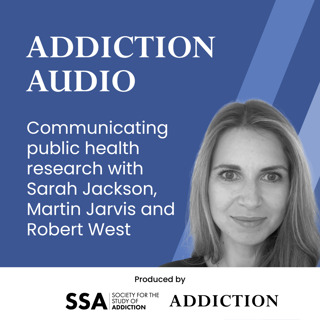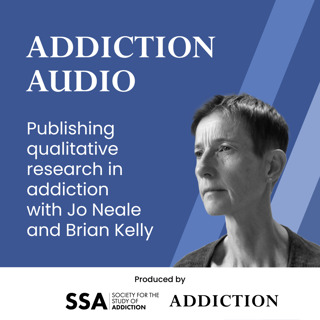
Publishing qualitative research in addiction with Jo Neale and Brian Kelly
In this episode, Dr Elle Wadsworth speaks to Professor Joanne Neale from the Addictions Department at King’s College London and Professor Brian Kelly from the Department of Sociology at Indiana University. The interview covers their editorial titled, ‘Over a decade later and Addiction journal is still committed to publishing qualitative research’. · The origins of the editorial and why it is needed [01:01]· The goal of the changes Addiction is implementing for qualitative submissions [01:44]· The importance of increasing the word limit to 6,000 words [02:49]· Whether similar journals in the addiction field struggle with low numbers of qualitative submissions [04:19]· The increase in qualitative editors at the Addiction journal since 2013 [05:52]· Finding consensus among a diversity of disciplines on the editorial board [07:21]· Semi-quantification over quantification in qualitative research [08:30]· What the authors hope to achieve with this editorial [09:36]· The take-home messages for qualitative researchers [11:04]About Professor Joanne Neale: Jo is Professor of Addictions Qualitative Research based within the National Addiction Centre at the Institute of Psychiatry, Psychology and Neuroscience, King’s College London, UK. She is also Conjoint Professor in the Centre for Social Research in Health at UNSW Sydney, Australia. Joanne trained in social work and is the Patient and Public Involvement and Engagement Lead for the UK NIHR Addictions Policy Research Unit. Her current research focuses largely on patient perceptions of treatments and interventions for alcohol and other drug use. In the last three years, Joanne Neale has received, through her university, research funding from Mundipharma Research Ltd and Camurus AB and honoraria from Camurus AB and Indivior for presentations.About Professor Brian Kelly: Brian is a Professor of Sociology at Indiana University and also Senior Research Program Leader at the Irsay Institute. His research examines social contextual influences on health, mainly focusing on substance use. His current research projects include the influence of policy contexts on youth substance use trajectories, sibling socialisation processes of adolescent substance use, and the impact of disasters on community drug-related outcomes.Original editorial: Over a decade later and Addiction journal is still committed to publishing qualitative research https://doi.org/10.1111/add.70047 Qualitative guidelines for Addiction: (1) https://doi.org/10.1111/add.12408 and (2) https://doi.org/10.1111/add.12857The opinions expressed in this podcast reflect the views of the host and interviewees and do not necessarily represent the opinions or official positions of the SSA or Addiction journal.The SSA does not endorse or guarantee the accuracy of the information in external sources or links and accepts no responsibility or liability for any consequences arising from the use of such information. Hosted on Acast. See acast.com/privacy for more information.
30 Maj 12min
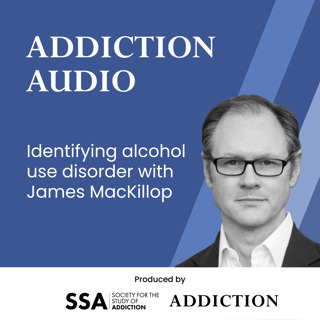
Identifying alcohol use disorder with James MacKillop
In this episode, Dr Tsen Vei Lim talks to Dr James MacKillop, a clinical psychologist and professor at McMaster University in Canada, and director for both the Peter Boris Centre for Addictions Research and the Michael G DeGroote Centre for Medicinal Cannabis Research. The interview covers his research report on the diagnostic validity of drinking behaviour for identifying alcohol use disorder (AUD) with findings from a representative sample of community adults and an inpatient clinical sample. · What alcohol use disorder is and how it is currently diagnosed [01:41]· The surprising exclusion of drinking behaviour in AUD diagnosis [03:03]· Unpacking ‘receiver operating characteristic curves’ [04:42]· The key findings of the study [05:45]· Whether James’ findings will change how we think about diagnosing AUD [07:35]· Why clinicians would benefit collecting how much people are drinking in one session [09:32]· Whether an indicator of heavy drinking would be helpful in treatment settings [10:35]· Bringing objective data into clinical application [12:09]· Whether we can use a similar metric to other drugs, such as cannabis [13:09]· What we can learn for policy and further research [15:56]· The barrier of the lack of biomarkers in alcohol use disorder [18:00]· The take-home message of the paper [19:40]About Tsen Vei Lim: Tsen Vei is an academic fellow supported by the SSA, currently based at the Department of Psychiatry at the University of Cambridge. His research integrates computational modelling, experimental psychology, and neuroimaging to understand the neuropsychological basis of addictive behaviours. He holds a PhD in Psychiatry from the University of Cambridge (UK) and a BSc in Psychology from the University of Bath (UK). About James MacKillop PhD, CPsych, FCAHS: Dr. MacKillop holds the Peter Boris Chair in Addictions Research and a Canada Research Chair in Translational Addiction Research at McMaster University and St. Joseph’s Healthcare Hamilton. There, Dr. MacKillop directs both the Peter Boris Centre for Addictions Research and the DeGroote Centre for Medicinal Cannabis Research. Dr. MacKillop trained as a clinical psychologist at Binghamton University and Brown University and studies addiction using a multidisciplinary approach, integrating psychology, economics, neuroscience, and genetics. James receives unrestricted research funding from Canadian Institutes on Health Research, the National Institutes of Health, and Correctional Services of Canada and am a senior scientist and principal in Beam Diagnostics, Inc., a technology transfer start-up company. The latter had no relationship to the publication in Addiction.Original article: Diagnostic validity of drinking behaviour for identifying alcohol use disorder: Findings from a representative sample of community adults and an inpatient clinical sample. https://doi.org/10.1111/add.70037The opinions expressed in this podcast reflect the views of the host and interviewees and do not necessarily represent the opinions or official positions of the SSA or Addiction journal. The SSA does not endorse or guarantee the accuracy of the information in external sources or links and accepts no responsibility or liability for any consequences arising from the use of such information. Hosted on Acast. See acast.com/privacy for more information.
16 Maj 20min
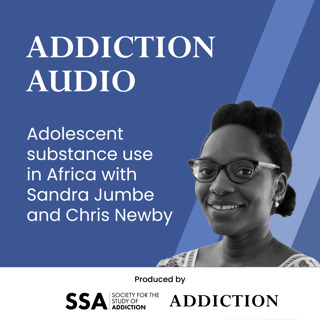
Adolescent substance use in Africa with Sandra Jumbe and Chris Newby
In this episode, Dr Elle Wadsworth speaks to Dr Sandra Jumbe from the School of Social and Health Sciences at Millenium University in Malawi and the Wolfson Institute of Public Health Queen Mary, and Dr Chris Newby from the Medical School at the University of Nottingham. Sandra and Chris discuss their findings from a systematic review and meta-analysis on factors associated with adolescent substance use in Africa between 2000 and 2020. · What do we already know about adolescent use in Africa and why this review was needed [01:40]· The headline findings of the review [03:50]· What the consolidation of findings in this topic area will achieve [05:58]· The themes that came out of the ‘non-familial’ category of factors associated with adolescent substance use [09:00]· The main themes that came out of the ‘socioeconomic or environmental’ category of factors associated with adolescent substance use [10:05]· The regional differences in the drugs consumed across Africa [12:10]· What drugs are captured in standardised surveys [14:29]· The experience of doing systematic reviews and meta-analyses [15:20]About Sandra Jumbe: Dr Jumbe is a health psychologist currently working as a senior lecturer in research at Millennium University in Blantyre Malawi and a health researcher at the Wolfson Institute of Population Health at Queen Mary University of London. She is also an African Research Initiative for Scientific Excellence (ARISE) fellow with the African Academy of Sciences. She is an expert in behavioural science, enabling her to set the foundations for evidence-based work that informs development of effective interventions and policy decisions to improve human health. She has worked in both clinical and academic settings in primary care and mental health. Dr Jumbe’s long term aspiration is to expand understanding of global mental health and substance use, by advancing research niched on youth mental health in Africa, while training fellow young African scientists. She is also a mental health advocate, passionate about improving mental health literacy at grassroots level using community engagement and culturally sensitive approaches.About Chris Newby: Dr Newby is a senior medical statistician at the Research Knowledge Exchange, at the Medical School at the University of Nottingham. He has worked in NIHR Biomedical Research Units, Clinical Trial Units and is currently a senior quantitative advisor at the Research Support Service Leicester Hub and Partners. His interests are Respiratory, Mental Health and Equality Diversity and Inclusion in Health Research. Sandra, Chris nor Elle have any conflicts of interest to declare.Original article: A systematic review and meta-analysis of factors associated with adolescent substance use in Africa, 2000 to 2020: https://doi.org/10.1111/add.70023The opinions expressed in this podcast reflect the views of the host and interviewees and do not necessarily represent the opinions or official positions of the SSA or Addiction journal.The SSA does not endorse or guarantee the accuracy of the information in external sources or links and accepts no responsibility or liability for any consequences arising from the use of such information. Hosted on Acast. See acast.com/privacy for more information.
17 Apr 18min
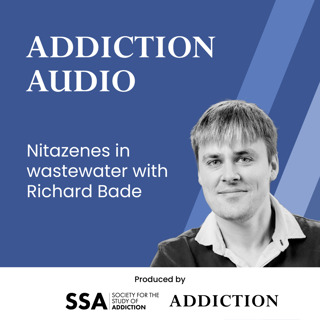
Nitazenes in wastewater with Richard Bade
In this episode, Dr Elle Wadsworth talks to Dr Richard Bade from Queensland Alliance for Environmental Health Sciences at the University of Queensland about his and his co-authors research report on the identification of nitazenes through wastewater analysis, using two-years of data from 22 countries. Richard discusses why a study detecting nitazenes in wastewater was needed and what the future for detecting nitazenes in wastewater looks like, including implications for policy and practice. · What is wastewater analysis and how we use it in the field of drugs [01:21]· What are nitazenes and why they are a problem [02:28]· Why a study detecting nitazenes in wastewater was needed [03:31]· Whether there is a demand for nitazenes [04:08]· How Richard and his team chose the eight nitazenes to study [05:05]· The headline findings of the paper [05:55]· Whether a lack of nitazenes in wastewater means that they aren’t there or they are in too low concentration to be found [08:16]· The benefits of wastewater analysis to detect nitazenes [09:37]· The surprisingly high level of nitazenes in Australia [10:37]· What we can learn for policy and practice [11:47]· The joy and difficulties working with many co-authors! [14:11]About Elle Wadsworth: Elle is an academic fellow with the Society for the Study of Addiction. She is based at the University of Bath with the Addiction and Mental Health Group and her research interests include drug policy, cannabis legalisation, and public health. Elle is also a senior analyst at RAND Europe, working on projects focusing on national and international drug policies. About Richard Bade: Dr Richard Bade is a Senior Research Fellow at the Queensland Alliance for Environmental Health Sciences (QAEHS) within The University of Queensland. He completed his PhD at the University Jaume I, Castellon, Spain in 2016 before moving to the University of South Australia in 2017 and QAEHS in 2021. He is interested in understanding links between environmental and community health using wastewater analysis. His particular research interests are associated with the surveillance, detection and identification of new psychoactive substances (NPS) in wastewater and other matrices as well as exploring the impact of chemical and pathogen exposure during mass gatherings. Dr Bade currently leads an expanding international consortium exploring the prevalence of NPS worldwide. These data can help provide insights into the emergence of new, potent NPS, and ensure that public harm from their exposure is minimized. Original article: Early identification of the use of potent benzylbenzimidazoles (nitazenes) through wastewater analysis: two-years of data from 22 countries. https://doi.org/10.1111/add.70027The opinions expressed in this podcast reflect the views of the host and interviewees and do not necessarily represent the opinions or official positions of the SSA or Addiction journal.The SSA does not endorse or guarantee the accuracy of the information in external sources or links and accepts no responsibility or liability for any consequences arising from the use of such information. Hosted on Acast. See acast.com/privacy for more information.
11 Apr 15min
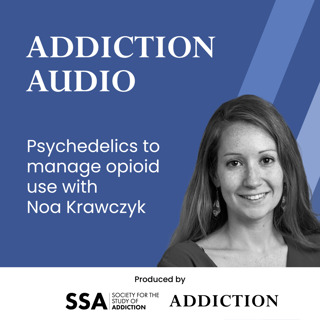
Psychedelics to manage opioid use with Noa Krawczyk
In this episode, Dr Elle Wadsworth talks to Dr Noa Krawczyk from the Department of Population Health at NYU Grossman School of Medicine about her and her co-authors research report on self-reported experiences and perspectives on using psychedelics to manage opioid use among participants of two Reddit communities. Noa discusses the current treatments available for opioid use disorder and why psychedelics are having their moment as an alternative medicine, and what people who use opioids found when taking psychedelics with the intention of reducing or stopping their opioid use. · What is Reddit and why is Noa using it to answer her research questions [01:24]· The headline findings of the study [02:17]· The comparison of demographics of Reddit and the wider population of people who use opioids [03:46]· What the current treatments are for opioid use disorder in the US and why people are seeking alternatives [05:22]· Why Ibogaine stands out as a prominent psychedelic in the discussion [08:12]· The mechanisms of action found in the analysis [09:45]· The benefits and drawbacks of using psychedelics [13:26]· What we can take from the paper for policy and practice [15:28]About Elle Wadsworth: Elle is an academic fellow with the Society for the Study of Addiction. She is based at the University of Bath and her research interests include drug policy, cannabis legalisation, and public health. Elle is also a senior analyst at RAND Europe, working on projects focusing on national and international drug policies. About Noa Krawczyk: Noa Krawczyk, PhD, is an assistant professor in the Department of Population Health at NYU Grossman School of Medicine and Associate Director of the NYU Langone Center for Opioid Epidemiology and Policy. Her research focuses on studying ways to address barriers to evidence-based treatment for opioid use disorder at the individual, program, and policy levels. Her work centers on bridging research and practice by collaborating with drug user organizations, health system leaders, public health and government agencies, and advancing science that can help inform evidence-based policies and practices that reduce harm and promote well being.About co-author Megan Miller: Megan Miller, MPH, is a Research Coordinator in the Center for Opioid Epidemiology and Policy at NYU Grossman School of Medicine and served as the primary data analyst for the Reddit study. She holds an MPH from the University of North Carolina at Chapel Hill. NK receives fees as an expert witness in ongoing opioid litigation. MM has no conflicts of interest to declare.Original article: Self-reported experiences and perspectives on using psychedelics to manage opioid use among participants of two Reddit communities https://doi.org/10.1111/add.16767 The opinions expressed in this podcast reflect the views of the host and interviewees and do not necessarily represent the opinions or official positions of the SSA or Addiction journal. The SSA does not endorse or guarantee the accuracy of the information in external sources or links and accepts no responsibility or liability for any consequences arising from the use of such information. Hosted on Acast. See acast.com/privacy for more information.
28 Feb 19min
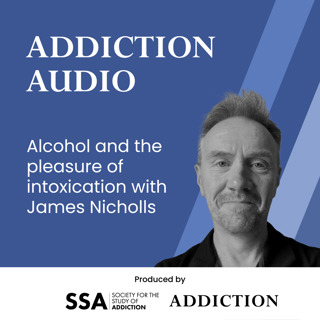
Alcohol and the pleasure of intoxication with James Nicholls
In this episode, Dr Elle Wadsworth talks to Dr James Nicholls from the University of Stirling about an opinion paper he co-authored with Professor Geoffrey Hunt on whether pleasure should receive more attention in public health-oriented alcohol research. They discuss what alcohol researchers and public health professionals can learn about ‘intoxication and pleasure’ from drug research, the different ways that the pleasure of drinking is made more socially acceptable, and what more research on pleasure could do for policy and practice. · Why public health research has historically not explored the pleasure of alcohol intoxication [01:04]· Why this is an important topic to raise with the public health research community now [02:58]· Clarifying what type of pleasure is most neglected [04:55]· Measuring intoxication as pleasure and recognising the limitations of our methodologies [06:50]· Three broad reasons why additional attention should be paid to intoxication as pleasure [08:46]· What learning more about the pleasure of intoxication means for policy and practice [12:06]· The anticipation of publishing an opinion piece for debate [14:28]About Elle Wadsworth: Elle is an academic fellow with the Society for the Study of Addiction. She is based at the University of Bath with the Addiction and Mental Health Group and her research interests include drug policy, cannabis legalisation, and public health. Elle is also a senior analyst at RAND Europe, working on projects focusing on national and international drug policies. She holds a PhD in public health and health systems from the University of Waterloo (Canada), an MSc in addiction studies from King's College London (UK), and a BSc in chemistry from the University of Bristol (UK).About James Nicholls: James is a Senior Lecturer in Public Health at the University of Stirling, specialising in alcohol and drug policy research. Recent projects include leading a needs assessment for a safer drug consumption facility in Edinburgh, and a statutory review of the alcohol licensing system in Northern Ireland. He has also published recently on moral philosophy and drug policy advocacy. James was previously Director of Research and Policy at Alcohol Change UK, and Chief Executive Officer of Transform Drug Policy Foundation. James has no conflicts of interest to declare.Original article: Taking pleasure seriously: Should alcohol research say more about fun? https://doi.org/10.1111/add.16747 The opinions expressed in this podcast reflect the views of the host and interviewees and do not necessarily represent the opinions or official positions of the SSA or Addiction journal. The SSA does not endorse or guarantee the accuracy of the information in external sources or links and accepts no responsibility or liability for any consequences arising from the use of such information. Hosted on Acast. See acast.com/privacy for more information.
24 Jan 16min
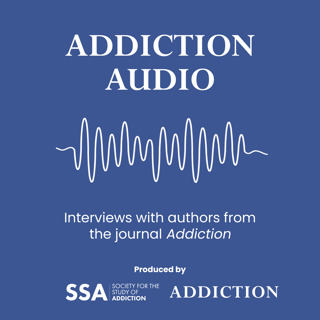
Young people and disposable e-cigarettes with David Hammond
In this episode Dr Elle Wadsworth talks to Professor David Hammond about vaping. They discuss policy differences between the Canada, the UK and the US as well as changes relating to disposable vapes and the use of nicotine salts. They cover the environmental impact of some of these products before talking about the different choices available to policymakers when developing regulations. “What the change has meant in England is that there’s probably more room for regulating some of these [vaping] products without undermining their use as a cessation aid”Original article: Use of disposable e-cigarettes among youth who vape in Canada, England, and the United States: repeat cross-sectional surveys, 2017-2023 by David Hammond and colleagues. Published in Addiction (2024). The opinions expressed in this podcast reflect the views of the host and interviewees and do not necessarily represent the opinions or official positions of the SSA or Addiction journal.The SSA does not endorse or guarantee the accuracy of the information in external sources or links and accepts no responsibility or liability for any consequences arising from the use of such information. Hosted on Acast. See acast.com/privacy for more information.
8 Aug 202422min
